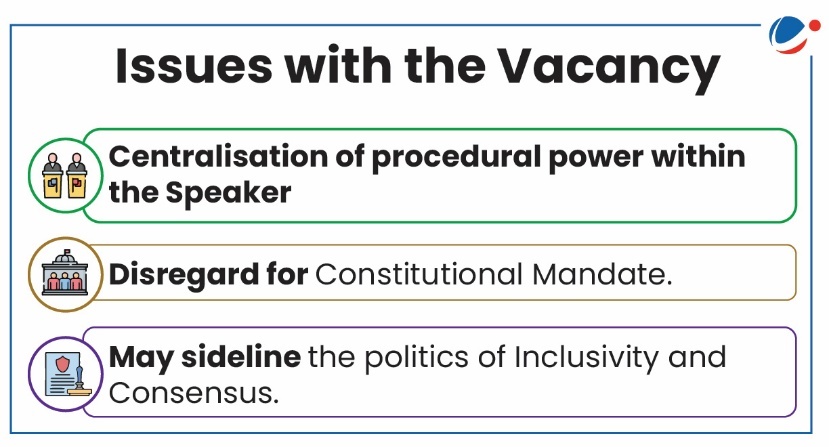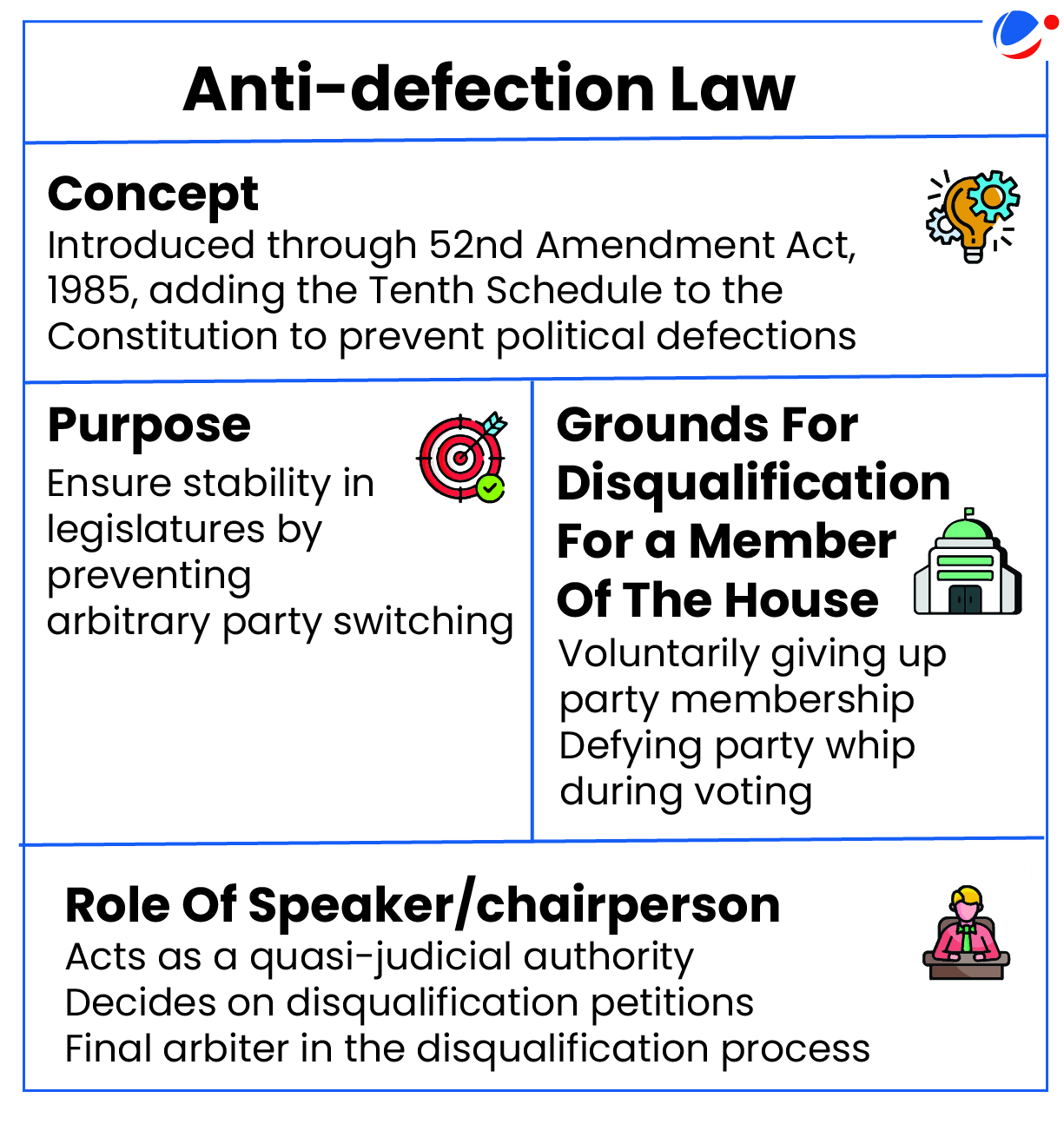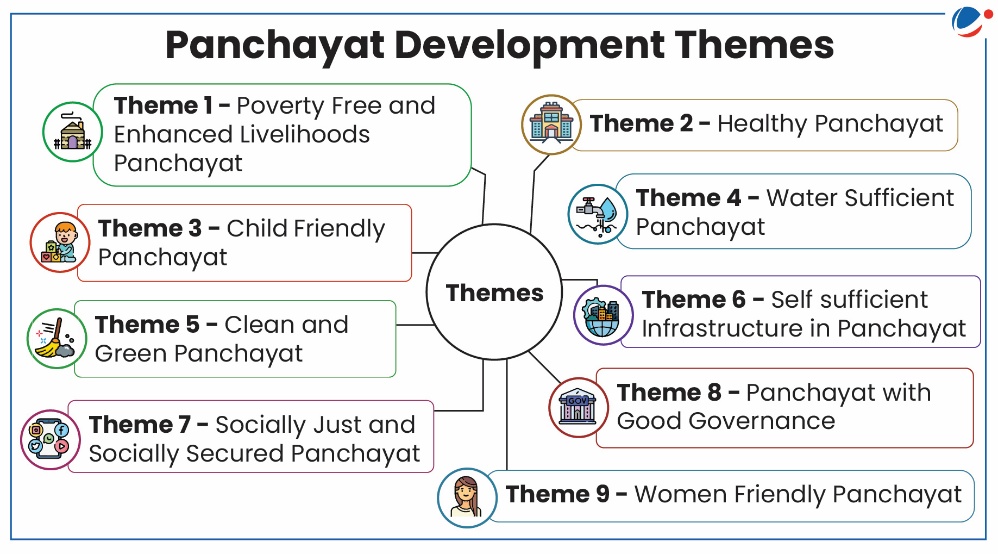Long term vacancy since 2019 to the office of Deputy Speaker (DS) points to Constitutional anomaly.
About DS of the Lok Sabha
- Background: The office emerged in 1921 under Government of India Act, 1919.
- Sachidananda Sinha first held this office in the Central Legislative Assembly.
- M. A. Ayyangar, became the first elected DS post-independence.
- Election: Article 93 provides that Lok Sabha, as soon as may be, choose two members of the House to be Speaker and DS.
- As per a long-standing convention, the post of DS has been offered to the Opposition.
- Resignation and Removal: Article 94 deals with vacation, resignation and removal (by a resolution passed by a majority of all then members of the House).
- Speaker may resign by submitting a resignation to the DS and vice-versa.
- Duties: As per Article 95, DS performs the duties of Speaker in case of vacancy, absence, etc.

Importance of the office of DS
- Constitutional Imperative: It is not merely ceremonial as the Constitution places it on an equal footing with the Speaker.
- Essential for continuity, stability, and institutional balance: As the DS acts as a second in command in case of emergency.
- M.A. Ayyangar served as the acting Speaker after the sudden death of Speaker G.V. Mavalankar in 1956.
- Legislative Responsibilities: DS chairs key sessions, leads committees, and manages sensitive debates requiring neutrality and authority.
Conclusion
A specific deadline (E.g., 60 days of the first sitting of the new Lok Sabha) or a statutory mechanism could be introduced to ensure appointment within a timeframe.
Supreme Court (SC) condemned prolonged inaction by speakers on defection petitions.
- The SC said Speaker could not use his indecision to defeat the worthy objective of the Tenth Schedule (anti-defection law) of the Constitution.
- Question of Law in front of Supreme Court: Can constitutional courts direct Speakers, acting as quasi-judicial tribunals, to decide anti-defection disqualification petitions within a specific timeframe?

Supreme Courts Observations
- Court’s Power Over Speaker’s Inaction: The SC stated that it is not “powerless” if Speaker remains “indecisive” on disqualification petitions.
- Court’s Right to Set a Reasonable Timeframe: While courts cannot dictate the outcome of a disqualification petition, they can direct the Speaker to decide within a reasonable period.
- E.g., Keisham Meghachandra Singh v. Speaker, Manipur Legislative Assembly (2020).
- If the Speaker fails to act: The SC can invoke its extraordinary powers under Article 142.
Other SC Observations to Improve Implementation of Anti-Defection Law
- Judicial Review Over Speaker’s Decisions: Courts should have the authority to intervene if the Speaker delays action. Case: Kihoto Hollohan v. Zachillhu (1992).
- Impartiality of the Speaker: The Speaker should act as a neutral adjudicator rather than a political figure. Case: Ravi S. Naik v. Union of India (1994).
- Independent Tribunal for Disqualification Cases: Consider transferring disqualification powers from the Speaker to an independent tribunal. Case: Karnataka MLAs’ disqualification case (2020).
The Bill is passed by the Parliament.
Key Highlights of the Bill
- Objective: To modernize immigration laws, enhance national security, and improve coordination among immigration authorities.
- Bills repealed:
- Passport Act, 1920
- Registration of Foreigners Act, 1939
- Foreigners Act, 1946
- Immigration (Carriers’ Liability) Act, 2000
- Immigration Regulation: A Bureau of Immigration will oversee visa issuance and entry-exit regulations.
- Penalties: Penalizes foreigners entering without valid passport or other travel documents with imprisonment of up to five years, fine up to five lakh rupees, or both.
- Power of arrest: Police officers not below the rank of a Head Constable can arrest without a warrant.
Ministry of Panchayati Raj Introduced Panchayat Advancement Index (PAI) to Assess Gram Panchayat Performance.
- There are 2.5 lakh gram panchayats in the country. Out of these, data of around 2.16 lakh gram panchayats from 29 States have been assessed.
- Panchayat means an institution of self-government constituted under Article 243B, for the rural areas.

About Panchayat Advancement Index (PAI)
- Concept: PAI is a multi-domain and multi-sectoral index that is intended to be used to assess the overall holistic development, performance & progress of panchayats.
- Aims: Measure how well these grassroots institutions are achieving localized Sustainable Development Goals (SDGs).
- Themes: The index evaluates panchayats based on nine key themes related to local development (See image).
- Categories in the PAI
- Achiever (0%): No panchayat in India achieved the ‘achiever’ rank in this year’s assessment.
- Aspirant (61.2%): The largest percentage of panchayats fall under this category.
- Performer (36%): A significant portion of panchayats has achieved moderate progress.
- Front-Runner: Gujarat topped the rankings with the highest number of panchayats in this category.





